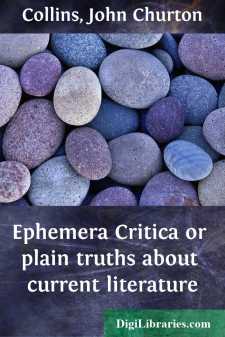Categories
- Antiques & Collectibles 13
- Architecture 36
- Art 48
- Bibles 22
- Biography & Autobiography 813
- Body, Mind & Spirit 142
- Business & Economics 28
- Children's Books 17
- Children's Fiction 14
- Computers 4
- Cooking 94
- Crafts & Hobbies 4
- Drama 346
- Education 46
- Family & Relationships 57
- Fiction 11829
- Games 19
- Gardening 17
- Health & Fitness 34
- History 1377
- House & Home 1
- Humor 147
- Juvenile Fiction 1873
- Juvenile Nonfiction 202
- Language Arts & Disciplines 88
- Law 16
- Literary Collections 686
- Literary Criticism 179
- Mathematics 13
- Medical 41
- Music 40
- Nature 179
- Non-Classifiable 1768
- Performing Arts 7
- Periodicals 1453
- Philosophy 64
- Photography 2
- Poetry 896
- Political Science 203
- Psychology 42
- Reference 154
- Religion 513
- Science 126
- Self-Help 84
- Social Science 81
- Sports & Recreation 34
- Study Aids 3
- Technology & Engineering 59
- Transportation 23
- Travel 463
- True Crime 29
Ephemera Critica or plain truths about current literature
Description:
Excerpt
PREFACE
It is time for some one to speak out. When we compare the condition and prospects of Science in all its branches, its organization, its standards, its aims, its representatives with those of Literature, how deplorable and how humiliating is the contrast! In the one we see an ordered realm, in the other mere chaos. The one, serious, strenuous, progressive, is displaying an energy as wonderful in what it has accomplished as in what it promises to accomplish; the other, without soul, without conscience, without nerve, aimless, listless and decadent, appears to be stagnating, almost entirely, into the monopoly of those who are bent on futilizing and degrading it.
Science stands where it does, not simply by virtue of the genius, the industry, the example of its most distinguished representatives, but because by those representatives the whole sphere of its activity is being directed and controlled. The care of the Universities, the care of learned societies, the care of devoted enthusiasts, its interests and honour are watchfully and jealously guarded. The qualifications of its teachers are guaranteed by tests prescribed by the highest authorities on the subjects professed. To standards fixed and maintained by those authorities is referred every serious contribution to its literature. Even a popular lecturer, or a popular writer, who undertook to be its exponent would be exploded at once if he displayed ignorance and incompetence. Such, indeed, is the solidarity of its energies that it is rather in the degrees and phases of their manifestation than in their essence and characteristics that they vary. There is not a scientific institution in England the regulations and aims of which do not bear the impress of such masters as Huxley and Tyndall and their disciples; not a work issuing from the scientific Press which is not a proof of the influence which such men have exercised and are exercising, and of the high standard exacted and attained wherever Science is taught and interpreted.
It is far otherwise with Literature. Those who represent it, in a sense analogous to that in which the men who have been referred to represent Science, have neither voice nor influence in its organization, as a subject of instruction, at the centres of education. They neither give it the ply, nor in any way affect its standards and its character in practice and production. As examples few follow them, as counsellors no one heeds them. They constitute what is little more than an esoteric body, moving in a sphere of its own.
And yet there is no reason at all why there should not be the same solidarity in the activity of Literature as there is in the activity of Science, and why the standard of aim and attainment in the one should not be as high as in the other. But this can never be accomplished until certain radical reforms are instituted, and the first step towards reform is to demonstrate the necessity for it. I have done so here. I have drawn attention to the state of things in our Universities,âin other words, to what I must take leave to call the scandalous and incredible indifference of the Councils of those Universities to the appeals which have, during the last fifteen years, been made to them to place the study of Literature, in the proper sense of the term, upon the footing on which they have placed other studies....



